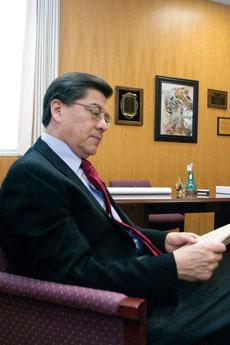León reflects on birth of international mission

Dr. Julio León reads a 1982 special edition of The Chart announcing his appointment as interim president. This summer will mark his 25th year at the helm.
[Editor’s note: This is the first in a series of stories on Dr. Julio León’s 25 years as president of Missouri Southern.]
This year marks Dr. Julio León’s silver anniversary as University president.
What began as an “undetermined” term as interim president, has transformed into years of molding Missouri Southern into what it is today. A significant change León implemented into the University was the international mission.
The international mission began in 1990, which was one year after the fall of the Berlin Wall and the disintegration of the Soviet Union.
“It just seemed obvious that the world was going to change rather dramatically,” León said. “At the time we felt it was important for Missouri Southern graduates to be well-prepared for the world that was going to unfold in front of us.”
The mission exploded the mid 1990s with the sudden growth of the Internet. With the fall of the Berlin Wall and the Internet development, the two interconnected for rapid globalization.
The steps were small in the early years of the international mission. Gradually, there were new programs to enhance international studies and business, more foreign language courses and study abroad opportunities for students. Then, in 1995, the Coordinating Board for Higher Education, the Missouri General Assembly and the governor proposed for universities to specialize in particular aspects of education. The buzz words were ‘mission enhancement.’
“There was opposition in the legislature and people were asking, ‘Why Joplin? They don’t even have a national airport,'” León said. “But we thought, ‘Why not?’ Our students are just as important as the students up in Kansas City or anywhere else.”
Funding was eventually provided and, as a result, between 1996 and 2000 Southern was able to add other activities like traveling abroad opportunities for students and faculty. The curriculum began to transform and new programs in international business and international studies grew. At the time of Southern’s rapid growth, León said the faculty were on his side.
“I think they were interested, but wondering if this was necessary or the right thing, at least no one was opposed to the idea,” he said. “I think when people saw what was happening in the world they began to realize this would be important and little by little more and more support became evident.
“The faculty of this institution are tremendously qualified and capable,” León said. “They are outstanding teachers in the classroom. If you really look at different departments, you will see every one has an activity where they take students abroad for trips. Whether it’s education with student teaching in England, or biology with the biology course in Costa Rica, whether it’s the foreign language or the business school, look at the criminal justice department. They take 20 or so students and faculty abroad to study different justice systems all over the world.”
Your donation will support the student journalists of Missouri Southern State University. Your contribution will allow us to purchase equipment and cover our annual website hosting costs.



























